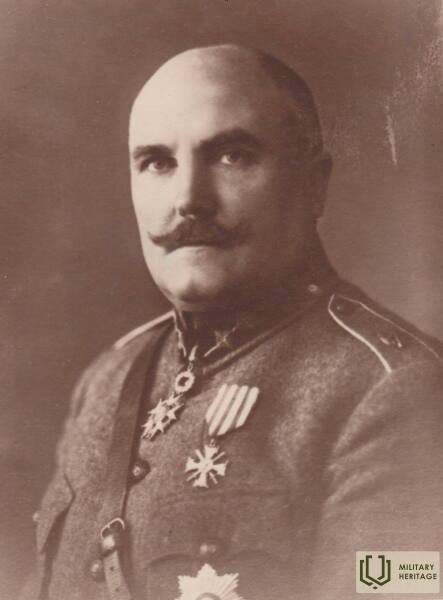Mārtiņš Peniķis (1874- 1964) Commander of the Latvian Army, General
I World War I, I Wars of Independence, II World War II, IV Soviet Occupation
Mārtiņš Peniķis was born on November 6, 1874, in the village of Ķoniņi, Kuldīga district, into a family of ancient Curonian freeholders (Ķoniņi). He studied at the Kuldīga Ministry School and further educated himself.
In 1896 he joined the Russian army, served in the 133rd Simferopol Infantry Regiment. In 1900 he entered the Chuguyev Junker School. In 1902 he was promoted to lieutenant colonel and assigned to the 121st Infantry Regiment in Kharkov. He participated in the Russo-Japanese War.
In 1913 he was admitted to the Nicholas Military Academy. At the beginning of World War I he returned to the regiment. As a company commander he participated in battles on the Galician Front, was seriously wounded. After recovering he fought in several battles near Krakow. In 1915 he participated in the summer battles against Mackensen's army, later in the rearguard battles from Brestlitovsk to Baranovichi. In the summer of 1916 he fought on the Shara River as a battalion commander. Promoted to colonel, counting from 1915. November 26.
On November 16, 1916, he was appointed commander of the 2nd Riga Latvian Riflemen Regiment. He participated in the Christmas battles, fought at Ložmetējkalns. Awarded the Juris Sword. In September 1917, he defended positions on the banks of the Mazā Jugla River. In early 1918, he left the service and remained in Vidzeme. He fell into German captivity, returning from there at the end of November 1918.
After the establishment of the Latvian state, he voluntarily joined its armed forces and on December 8, 1918, was appointed chief of the Courland War District, later a member of the Commission for the Development of Troop Plans and Staff Organization. From June 1919, chief of the Latvian troops of the Liepāja District with the rights of a division commander. At the beginning of the Bermont Offensive, he was appointed commander of the 2nd Vidzeme Division and commander of the Southern Front. He led subordinate units in battles from Riga to the Lithuanian border, and then participated in battles against the Bolsheviks in Latgale.
He was one of the first to be awarded the Lāčplēsis War Order, III class, appointed a member of the LKO Council, chairman of the Council until the adoption of the order's statutes by the Constitutional Assembly, then a member of the council chairman. In 1927, he was awarded the LKO II class.
On July 30, 1920, he was appointed Chief of the General Staff of the Latvian Army. Promoted to general, effective February 5, 1920. In 1921-1924, he was an Inspector of Troops. In 1928, he was appointed Commander of the Army. He held this position until 1934, when he retired.
M.Peniķis has studied military history, lectured at the Higher Military School; author of many books. Was awarded the Mazsalija mill in Snēpele parish. Awarded many Latvian, Tsarist Russian and foreign orders.
In 1943, he refused the offered position of Inspector General of the Latvian Legion. In 1944, he and his family went as refugees to Germany. He ended up in the Soviet occupation zone, from which he returned to Latvia. He lived in Riga, engaged in military history research. Mārtiņš Peniķis died on February 18, 1964 in Riga and was buried in the Forest Cemetery.
More information sources
Ēriks Jēkabsons. Mārtiņš Peniķis. – National Encyclopedia. https://enciklopedija.lv/skirklis/29981-M%C4%81rti%C5%86%C5%A1-Peni%C4%B7is
Biography of Mārtiņš Peniķis Lāčplēsis, Knight of the Military Order. https://web.archive.org/web/20150115071605/http://www.lkok.com/detail1.asp?ID=2121








